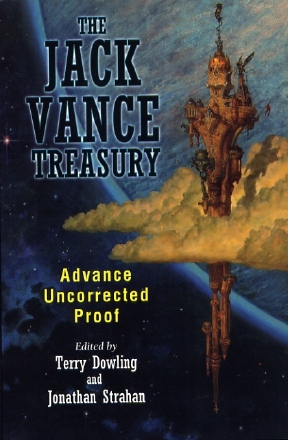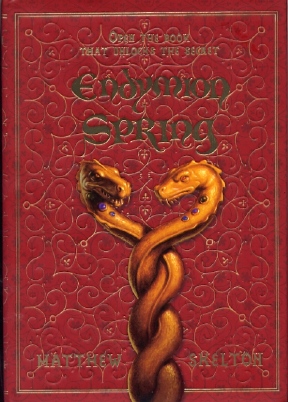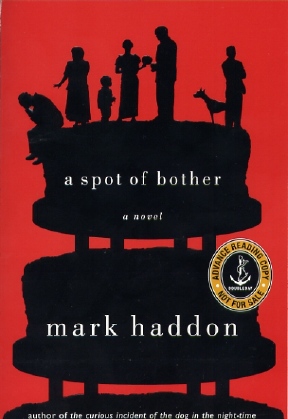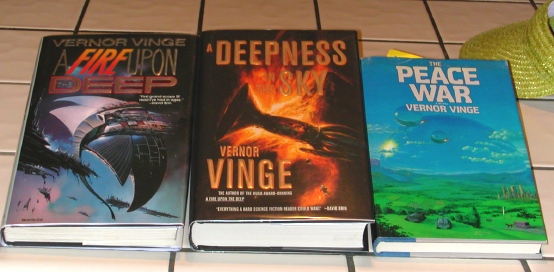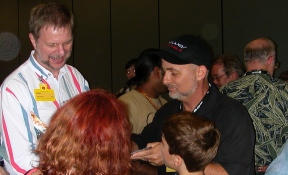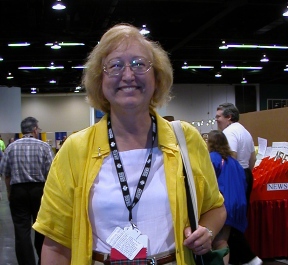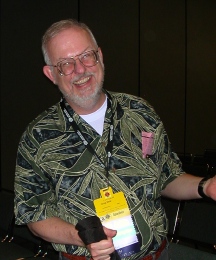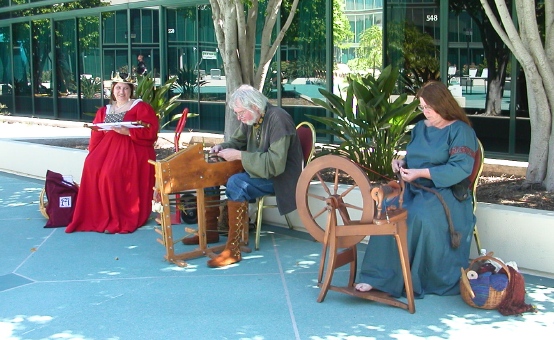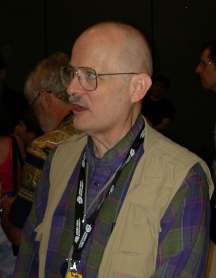|
|
|
This Just In...News from the Agony Column
|
09-01-06: Keeping the Purple Pages Alive |
|||
The
Jack Vance Treasury
Alas, not everyone in the publishing world sees it the way we do. As you grow older you start twig to this, that the books you hold in your hand had best be saved and held tightly. One cannot rest assured that today's obvious treasure will pop up again five, ten, fifteen years hence in the grocery store paperback racks, with the design de jour and the then-contemporary equivalent of raised mirror-foil lettering. Sometimes the books and stories we love go away, and if they come back you’d better grab 'em while you can, and save them carefully. But fortunately, we're not alone in the reading business. Some of us get so het up about it that we actually do something. Folks like William Schafer of Subterranean Press, who is among the independent publishers dedicated to making sure that the greats are still current, still there for you to grab off your shelves. With 'The Jack Vance Treasury' (Subterranean Press ; January 2007 ; $38), he's keeping the purple pages alive. It's important work, both the publishing and the published. Vance paved the way for readers and writers both. He took us deep into ourselves by way of his own peculiar and powerful visions that wove together wonder and humor. That gave us both deep space and a satisfying smile. One of the things that always drew me to Vance and his innovative combination of science fiction and fantasy was the sense of humor. Vance doesn't do jokes, exactly, or go for laughs. But there's a generous sense of life in his work, a great combination of nostalgia with an easygoing, devil-may-care attitude. You can sense this from the opening passages of 'The Dragon Masters' to the closing lines of 'The Last Castle', the stories that open and close this collection. 'The Jack Vance Tresury' is exactly what the title describes; a book of treasures, of the gems that litter the path of our literary history. We might toss aside those purple-paged books, but we'll not forget them. This is clearly not a book to be tossed aside; well, not at six-hundred-plus pages, at any rate. 'The Jack Vance Treasury' collects a great cross-section of novellas, novelettes and short stories. In addition to the raw fiction, you get an introduction by George R. R. Martin, one by the esteemed editors, Terry Dowling and Jonathan Strahan, plus, perhaps most importantly to me, afterwords for each piece by Vance himself. This sort of interstitial material is critical; it's the mortar, the grout, that binds the pieces into a gorgeous mosaic. You know, it just occurred to me that some readers might never have read Vance, and want a description of the material. When I was buying books with purple pages, Vance's writing was called Science Fantasy, and that seemed an appropriate appellation. He created scenes that had the feel of fantasy with the underpinnings of science fiction. His work was in a continuum that, for me at least (Back In The Day), included Michael Moorcock and M. John Harrison. These days, I suppose, he'd be clumped with the so-called "New Space Opera" or "Space Opera Renaissance" gang, and you know, that would be perfectly fit as well. I wonder where the old "Science Fantasy" category went? The great Book Rack in the Sky, I suppose. But I liked it and wish it would come back to save us. Science fantasy still seems an apropos description of much science fiction, and it's particularly appropriate for Jack Vance. But so is "New Space Opera". Oh there's no hard science fiction going on in Vance's work, so that's sort-of different. But as Charles Fort observes, science has fashions just as much as the rest of society. One moment's hard-science is another moment's dated theorem. It's not the science so much as the vision that informs the best science fiction, the vision of humanity, unfettered and at large in a cosmos as vast as our minds. And limited only by purple-edged pages. |
|
08-31-06: The Oxford Connection |
||||||
Matthew
Skelton and Mark Haddon
I suppose I shouldn't give them ideas, should I? So just forget I said that, un-write it from your publicizing brain if indeed you are a publicist and trawling through this non-blog, looking for ideas and angles. I un-write that! No wait, not only did I not un-write that, I wrote it, I marked it up with bevy of HTML tags, uploaded it, perhaps even proofread it. I must have meant it. I'm very deliberate here. Still, I hope that I don’t get automated calls from authors, even those I know, respect and like. Dan Simmons is a writer I like, so my first thought when I saw 'Endymion Spring' by Matthew Skelton was, "Is this title a total, direct rip-off of the Dan Simmons Hyperion sequels?" The answer is no. Yes, I had to check. It was easy, as I have my shelf-o'-Simmons in the living room. Just for posterity, the Simmons titles are: 'Endymion' and 'The Rise of Endymion'. But frankly, I doubt that they're going for a Simmons vibe here, even though that would at least be near the right genre. No, what they're trying to milk is the Oxford Connection. That is, they're trying to sell the book not based on any part of the content other than the setting of Oxford, which is the home of author Mark Haddon, who by coincidence, perhaps, has a new book coming out himself, titled 'A Spot of Bother' (Doubleday / Random House ; September 5, 2006 ; $25.95). You might remember that Haddon had what passes in my view as a MONSTER HIT NOVEL titled 'the curious incident of the dog in the night-time'. Here’s the follow-up; and here's the pitch; it's good, it's great, it's very, very different. That book was not set in Oxford, but the author is. Matthew Skelton has also spent some time in Oxford, so there you have it, in all its tenuous, diaphanous glory. The Oxford Connection. So, we have two very different books by two very different authors who have at some point in their lives spent some time in the same town. Damn you call that a trend, an inspiration or anything beyond a real stretch, and you'll have about fifty thousand authors clamoring for attention. I can see this. "From the same state as Stephen King." "From the county that brought you bestselling speculative fiction author Bruce Sterling." "Space opera from the same planet that brought you Alastair Reynolds!" Heck, I'm buying those, fer sure! Well, enough time-wasting fun, you want to know if these books are worth your valuable time and money, and as ever, I'd say–it's possible. You might very well love both these books, providing you don't hate books by folks who have spent some time in Oxford. If you're an anti-Oxford person who cannot abide the possibility that you might read fiction set in Oxford or written by those who may have passed through Oxford, you can safely skip the remainder of this column. If you're open to fiction that stands up to the Oxford Connection Test, well, now's your chance to check out some great new titles. Skelton's novel is a YA tome that fires off when a dapper young lad named Blake who is browsing the shelves of Oxford's Bodleian library when discovers a mysterious tome that pricks his fingers. But this is no typical tome. It's an atypical tome. Cursed, blessed or something in-between. Meanwhile, at lest in terms of the novel, but in real time, back in the 15th century in Germany, another dapper young lad is helping one Johannes Gutenberg mix inks for this weird contraption he's created that makes books. And there's this very special book. You can guess the title, I hope; I shall not divulge it again. But it shall come into play some five-hundred-something years later. Not an ordinary book. 'Endymion Spring' is a nicely conceived YA fantasy that's built around books and libraries and a soupcon of the supernatural and fantastic just keep the young minds (or lazy old minds such as mine) interested. I might say it's the only pulse-pounding novel about reading and libraries you're likely to find, but then, all one must do is consider 'The Historian', a fine novel that works some of the same territory. Knopf and the rest of the world seem to think that they've got a tiger by the tail with this librarian's delight, and to be sure, one can safely presume that libraries will snap it up like candy. What library buyer can resist the allure of a book about books, a dustless book about dusty books? But, should they pump out 150,000 copies (they have, or plan to), then it becomes the dusty book you’re tripping over while you're signing up to receive the last of the Books That Changed Reading As We Know It. You're bumping into the book that has been optioned for film. Oh, wait -- I'll take a nickel, just one slim nickel for every book that's optioned by Hollowood. Thank you very much, I do plan on keeping up the column even though I could retire. That's very good then. Skelton knows how to keep library-bound toes tapping and he knows how to make libraries and those things associated with them frightening for reasons beyond the fact that they simply contain books instead of video games, sodas and TiVo'd television premieres. This is arguably the best book about haunted books set in Oxford for young adults that you'll read this year. It's fast-paced and does not draw the reader's blood with poisoned fang locks unlike its namesake. That last is a plus. Should you be inclined to read a book about haunted books set in Oxford for young adults, then this is clearly the acme of your reading pleasure.
'A Spot of Bother' sports none of the pyrotechnics that made 'the curious incident of the dog in the night-time' such an instantly drinkable novel. This is a rather deliberate tale of the Hall family. George is sixty-one and getting used to retirement. He's got the sort-of ideal life. You know; wife, son, daughter, the latter getting married. Sounds great, eh? Now put that scenario through the sensibilities of the man who wrote 'the curious incident of the dog in the night-time', and what you have is something good deal less salubrious, a great British family novel about a not-so-great British family. Haddon preserves the short chapters of his first novel and this gives the novel a faster pace than one might expect of the "getting-ready-for-a-wedding" novel. He also preserves that so-bitter, so-sweet sense of humor, and makes it work without all the entertaining-when-he-wrote-about-them-before trappings of an autistic narrator. He sheds his skin as a quirky novel guy and spreads his wings as a fully-grown brilliant British observer of Our Really Screwed Up World. If you're feeling old and dreading retirement, perhaps this is really is or is not the book for you. But if you're in the mood for an amusing novel that includes a heaping side-dish of life, long and bitterly lived, then get ready to tuck in. Order early, snap up a Jonathan Cape UK hardcover (the true first edition) from a reputable vendor (I go with Tim Kendall Carpenter at timkcbooks.com, but you can do as you like) and drop it in a safety deposit box. Even if it does not prove to be a super-duper value, by the time you unearth, you may be old enough to really appreciate it. If you think you’re that old now, then well, heck. Set it aside for the reader for whom you bought 'Endymion Spring'. Let them discover the magic of a great book. But please, don’t poison the latches of the safety deposit box, though, if your family is anything like the one in 'A Spot of Both', you may be tempted. Resist. If you’re feeling stressed, read a book. |
|
08-29-06: A Momentary Note on the Road |
||
Vernor
Vinge and Kim Stanley Robinson Sequel News
It's Monday morning, and on a normal Monday, I'd be sorting through books and whatnot. But I may try to re-arrange my priorities and schedules this week to get caught up with some detailed reviews I want to catch up on, and soft-focus the news so to speak. Right now, I'm in Victorville, and the only new books I let myself buy at the convention were Vernor Vinge's 'A Fire Upon the Deep', 'The Peace War' and 'A Deepness in the Sky' in first edition hardcovers. Very nice. As it happens, if you noted yesterday's picture of Vinge, I'll now confess that it was only half the picture. The other half was me, asking him about what's next. So the big and unexpected news is that Vinge is working on a sequel to 'A Fire Upon the Deep'. This is going to make a lot of people very, very, happy, myself included. Where can Vinge take his ground-breaking space opera? We'll find out, hopefully within a year, though I didn't think to ask him about timing. And he told me that he feels obligated to follow up 'Rainbows End', and well he should. While the novel does have a satisfying resolution, it is a resolution that leads the reader to wish for more. That sequel will follow the sequel for 'A Fire Upon the Deep', and extend further the canon of science fiction set in the San Diego area, which, as Vinge pointed out, includes Kim Stanley Robinson's 'Forty Signs of Rain' and 'Fifty Degrees Below'. While we're on that subject, Robinson told me that he has in fact finished the final book in that trilogy, or rather, to my mind, the final portion of this huge meta-novel. We'll see that next spring, assuming we get a spring next year. If Robinson's vision is as prescient as it has proved to be thus far (remember the recent Washington DC floods, which were an eerie mirror of the final of 'Forty Signs of Rain'), well, spring is truly up in the air. In any event, it appears that 2007 will bring a bevy of much-anticipated sequels. This is certainly ideal from the publisher's point of view as well as the reader's; but time's a wastin'. It's been fourteen years since Vinge released 'A Fire Upon the Deep', and I know reader's hopes are as high as the intellect of some of the critters he describes within. Let's hope for a sort of middle path through the prescience and promise of these sequels. Let's hope the weather doesn't impact publishing schedules. It shouldn’t but, in a world of unknown unknowns, anything is up for grabs. The best bet is to stock up on books this moment. Fill your house to the rafters, just in case the weather takes a big turn for the worse. |
|
08-28-2006: WorldCon 2006 Wrap-Up |
|||||||||||||||
Audio
Podcast Report and Harlan Ellison Rant-O-Rama
That said, this year's awards seemed quite well chosen and awarded. I'm glad to see Doctor Who back and being honored. One hopes that next year we'll see Life On Mars in these nominations. But the chances of me getting to Japan are very remote. Even this trip, done on the road, was pretty dauntingly expensive. But we had a great time and it was lots of fun doing what Worldcons are for; catching up with old friends in the field, hearing them speak and chatting with new authors. I got quite a bit of excellent audio while I was here, and you'll be hearing it in the coming weeks.
Today's report was my attempt to toss together a sort of NPR style podcast that tried to give a feeling for the many facets of the Worldcon. You can hear the MP3 or the RealAudio files; your call. And as a bonus? Well, there's this little speech by Harlan Ellison, which was made possible by the kind and great talents of Charles Huff, who helped me plug in to the console. He's a champion, a gentleman and a scholar.
"Yeah, man." "Oh." My brain is skittering about, rather unprepared. "Uh, I really love your stories." "Thanks, man." Here it comes. It's not the final straw for this man, but I'm proud to have contributed to this particular stack. "Uh, where do you get your ideas?" "I don't know, they just come to me man." "Great." Big, silent duh on my part. "Well, thanks Mr. Ellison." "No problem." And that was my utterly polite conversation with one of America's Great Ranters. For those who might doubt this title, you need only enjoy the MP3 or the RealAudio recording of Ellison's one-man panel. Listen, he's the most brilliant comedian we have right now. He gives Lenny Bruce a run for his money. Forget all the SF stuff -- this man is just funny. He's also rude, crude and totally politically incorrect. He uses many very bad words that will offend just about everyone. This file is not work safe, it's not kid safe, it is utterly Unsafe. Which is why we love Harlan Ellison. It's not just because he fielded my prank phone call with coolness and élan. And now we turn control of your MP3 player over to you. If you play this aloud an offend someone -- tough. If you're offended -- tough. You were well-warned. |
